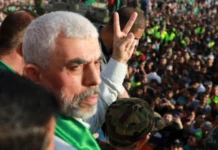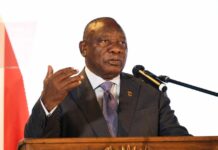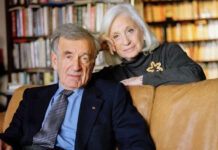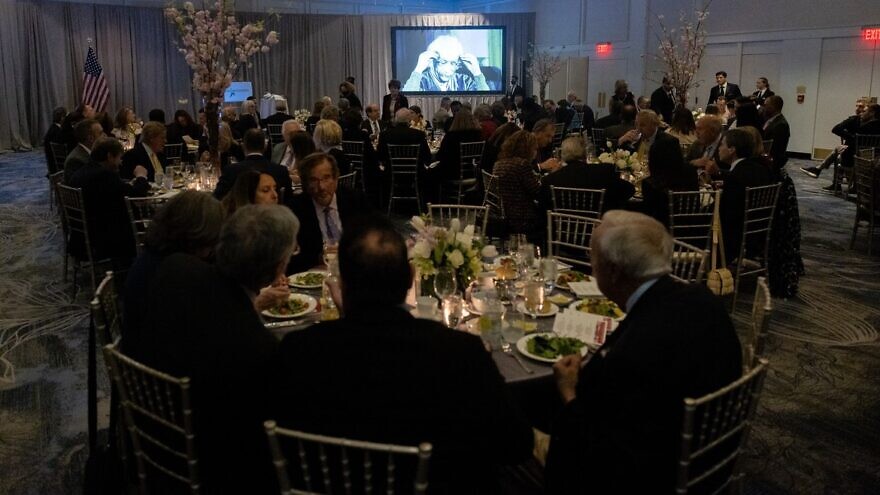American Friends of the Hebrew University held its annual SCOPUS Award Gala on April 28, where two politically involved couples from opposite parties were given the prestigious award in a show of bipartisanship and unity on behalf of the university’s mission.
Nearly 200 people filled the ballroom of the Four Seasons Hotel in the Georgetown neighborhood of Washington, D.C., where, earlier in the day, the Republican Jewish Coalition held its annual leadership meeting.
This year’s awardees were Democratic political strategist, pollster and president and CEO of Democratic Majority for Israel Mark Mellman; his wife, musician and music educator Mindy Horowitz; Republican Jewish Coalition executive director Matt Brooks; and his wife, nutritionist and health blogger Deborah Brooks.
Dan Schlessinger, board chairman of the Hebrew University of Jerusalem, who kicked off the program, said the honorees dedicated their lives to ensuring that the priorities of the Jewish community are made significant to national leaders and advocated for an enduring relationship between the United States and Israel.
Former Minnesota Republican senator and RJC board chairman Norm Coleman and Sen. Maria Cantwell (D-Wash.) co-chaired the event.
‘Fight for America’s pro-Israel stance’
Mellman and Horowitz did not appear in person to receive the award, though Mellman sent a speech that was read by Rednik in which he spoke of how the values he grew up with—Zionism, Judaism and education—were realized by the university.
“Like Judaism, it offers a unique blend of the particular and the universal,” wrote Mellman. The university and its faculty make tremendous contributions to the fields of Jewish philosophy and history, the study of the Bible, archeology and much more. But its seven faculties and 14 schools have also registered 7,000 patents and given the world Nobel laureates in economics, chemistry and physics; a Fields medalist in mathematics; and three Turing Award winners in computer science.”
He was also delighted that the university was working on integrating Israeli Arabs into Israeli society.
“Like Israel, like the Jewish people, Hebrew University is truly a … light onto the nations,” he wrote.
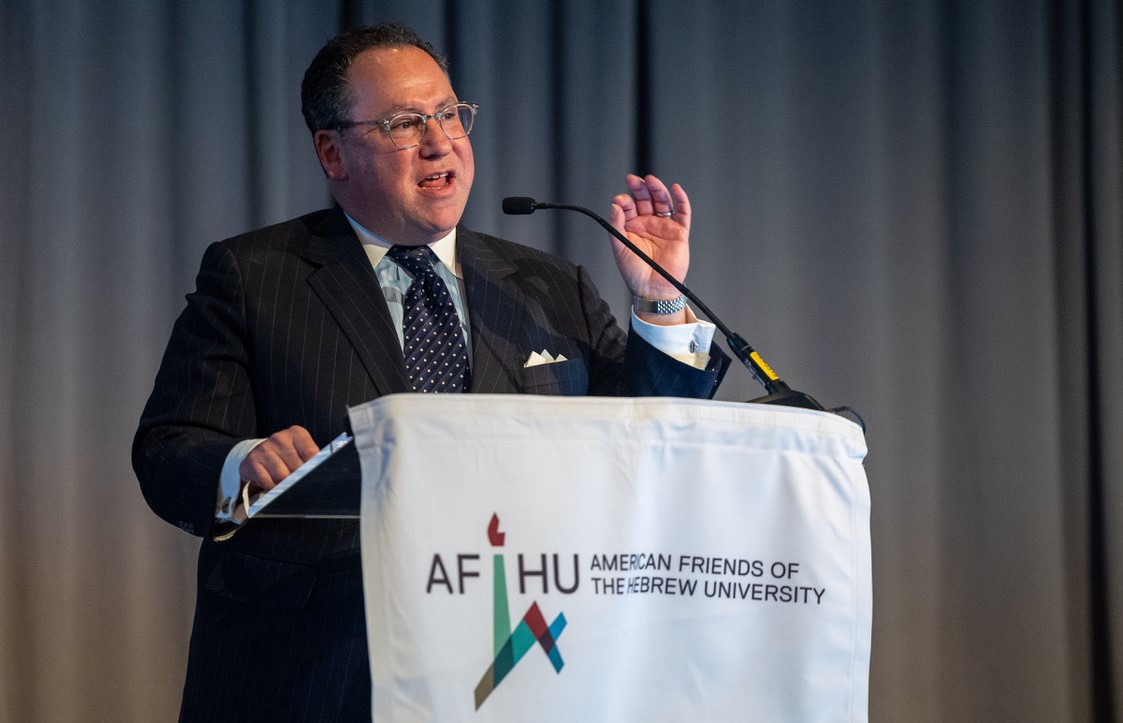
He also spoke about the major differences between him and Brooks, saying their opinions on American and Israeli politics couldn’t be more different.
“We probably never voted for the same candidate for any office; indeed, we’ve consistently worked to elect candidates who oppose each other,” he said.
“What divides us is vast. But what unites us is no less profound and important. We both love the Jewish people and the State of Israel; we support a strong U.S.-Israel relationship; and we are—each in our different ways—prepared to fight for America’s pro-Israel stance through our community’s and our country’s political process.”
Brooks followed Rednik’s reading of Mellman’s speech in person on stage, cheered by the majority of the night’s attendees who came to the event as a continuation of their leadership meeting.
Reading a list of comedians and actors who have received the award, including Johnny Carson, Frank Sinatra, Bob Hope and Billy Crystal, he joked that he concluded that someone at Hebrew University confused him with Mel Brooks.
He recalled how during a visit to Israel with the RJC 20 years ago, he was taken to a site of a recent suicide attack in a cafeteria of Hebrew University where nine people were killed—five of them Americans—and 100 more were wounded.
“One image that I would like to leave you with, one image that is seared indelibly in my mind,” he said: “Imagine a single white sneaker, still tied, soaked with blood on the floor of the cafeteria, surrounded by metal fragments intended to shred the human body. The smell of explosives still hung in the air.”
That, he said, came instantly to his mind when he was told he would be receiving the SCOPUS award.
“I’ll never know to whom that shoe belonged, but I think tonight of that young man or woman, and I remember you. And I’m here tonight because of you,” said Brooks.
“It’s hard for any of us to try to imagine what the Middle East looks like five or 10 years from now, but the fact that this is possible, the fact that this is happening, means it is changing. We just don’t know how fast or how far it’s going to change.” — UAE Ambassador to the United States Yousef Al Otaiba
But now, he was accepting an award on the same stage where moments before the ambassadors of Israel and the United Arab Emirates sat for a panel discussion.
“Twenty years ago, while standing amongst the carnage of the Hebrew University attack, I can never have predicted seeing what we saw on the stage tonight,” he said. “I’d call it a miracle if I didn’t know how much hard work it took to produce the diplomatic breakthrough that led to these gentlemen being together on the stage here tonight.”
Brooks said that he was touched by Mellman’s kind words about him, calling him a “mensch of mensches.”
“I have been proud to know, and work with and compete against Mark for many, many years and I’ve always, always been impressed by his willingness to work across party lines for shared values,” he said. “I think it’s interesting, that it’s oftentimes tougher in D.C. to get Republicans and Democrats to stand together than it has been to have Arabs and Israelis come together.”
The audience was surprised by a short, videotaped address by former President George W. Bush, who congratulated both award winners and received a spirited ovation from those in attendance.
Brooks said he was honored by the president’s words.
“Even President Bush’s harshest critics now have come to respect his humanity and his decency, and we who have followed and admired him over the years can take pride that now the qualities that we saw all along in this great president are now appreciated by all Americans of goodwill,” he said.
Other awards that night included an honorary doctorate bestowed on the late Supreme Court Justice Ruth Bader Ginsburg. The award was accepted by Ginsburg’s granddaughter Clara Spera.
Spera said that unlike other posthumous awards that were given to Ginsburg, she knew that the Hebrew University was going to give her an honorary degree, having been told in May 2020.
“And she was absolutely thrilled at the news,” said Spera. “She had hoped to be with you all at the celebration this evening.”
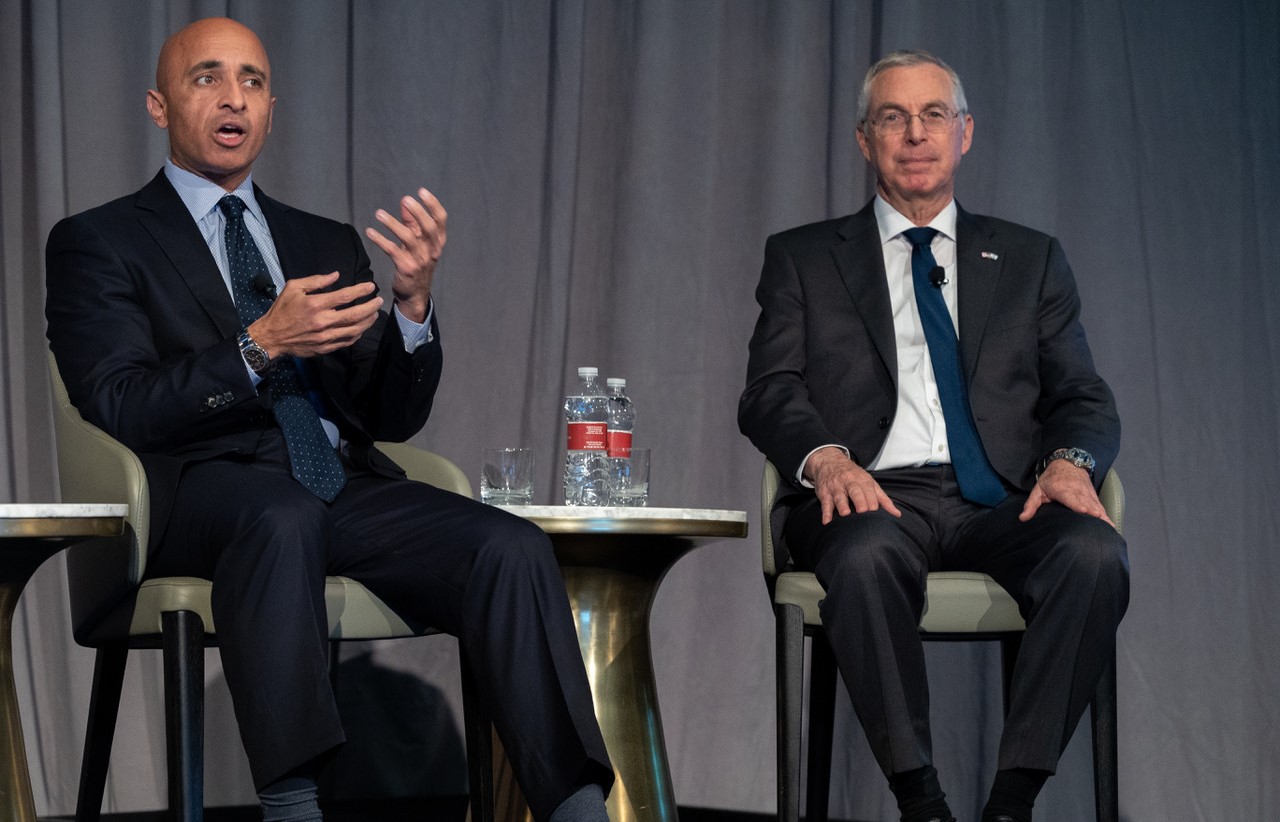
‘The relationships that exist are successful’
The program also featured a panel discussion with UAE Ambassador to the United States Yousef Al Otaiba and Israel’s Ambassador to the United States Michael Herzog, with Schlessinger moderating, speaking about the changes occurring in the Middle East as the result of the Abraham Accords.
Al Otaiba said that a year-and-a-half ago, it was difficult to imagine something similar to the event happening, having the ambassadors in the same room at an event hosted by a Jewish university on Yom Hashoah, Holocaust Remembrance Day.
“It’s hard for any of us to try to imagine what the Middle East looks like five or 10 years from now, but the fact that this is possible, the fact that this is happening, means it is changing. We just don’t know how fast or how far it’s going to change,” he said.
He and Herzog spoke about the already deepening trade relations between the UAE and Israel, and collaboration in the economic and scientific spheres, including a just signed free-trade agreement between the two nations.
“If you asked me a week after the Abraham Accords were signed, ‘Would it be possible?’ I would have told you it would take at least a few years,” he said.
Al Otaiba said since the Abraham Accords signing, the UAE has a lot to show for it, and he’s very optimistic they’re heading in the right direction, faster than expected.
Herzog agreed, saying improving relationships is bettering the well-being of the population and offering them a better future.
Trade continues to grow, said Herzog, and dozens of agreements have been signed within the government and private sectors. He called this the results of a “warm peace” as opposed to the “cold peace” Israel has had with Jordan and Egypt for years.
He said that he would like to see more countries added to the accords, the most significant of which would be Saudi Arabia, which plays an important role in the Muslim world, as well as other Muslim nations without a relationship with Israel.
Al Otaiba agreed, saying that he is often asked about which country he thinks will join the accords next and how soon.
“Every country has to come to this decision on their own, at their own time, based on their own politics, based on their own public opinion, based on their own view of the national interest. That’s what we did, we saw three other countries follow suit, but only because it was the right time for them,” he said. “Abraham Accords look much more attractive when these are successful, and the relationships that exist are successful. Other countries will take note and say, ‘Hey, this looks really good. This looks really attractive. How do I figure out how to do this?’ ”




